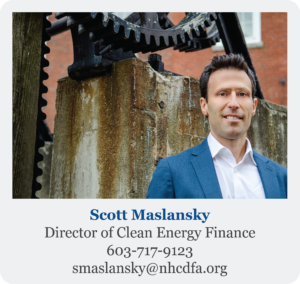Program Overview
This program is part of CDFA’s Clean Energy Fund, which provides low-interest loans along with energy technical assistance and project funding guidance to NH businesses, non-profits and municipalities for energy efficiency and renewable energy projects. Funding for this program is provided by a USDA Community Facilities Technical Assistance and Training grant. CDFA Awardees will be encouraged to apply to the USDA Community Facilities Direct Loan & Grant Program for support to implement their improvements.
Program Objectives
-
- Provide access for New Hampshire nonprofits and municipalities to reduced-cost studies that support implementation of energy efficiency and renewable energy installations that:
a. Reduce operating and maintenance costs
b. Reduce energy use and related environmental and health impacts
c. Provide non-energy benefits,including building durability, occupant comfort and safety, and workplace productivity; - Provide technical assistance to prospective applicants as well as to contractors and partners at any stage of project design;
- Coordinate with contractors, utilities and other partners to identify projects that might benefit from a broader assessment of energy opportunities; and
- Inform applicants about financial and technical resources from CDFA and other entities,and specifically USDA’s Community Facilities Direct Loan & Grant Program. The program intends to serve at least 10 different eligible NH communities.
- Provide access for New Hampshire nonprofits and municipalities to reduced-cost studies that support implementation of energy efficiency and renewable energy installations that:

